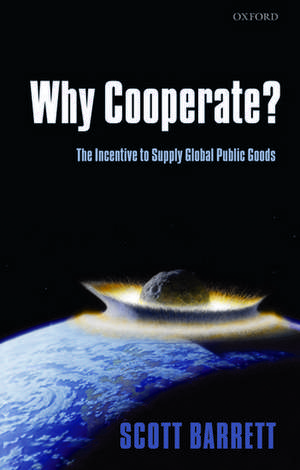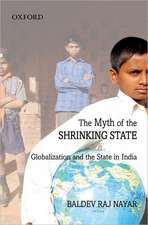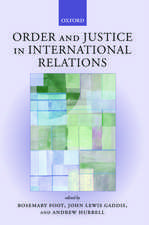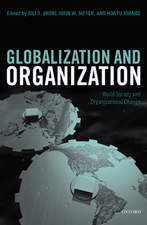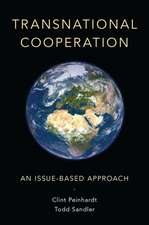Why Cooperate?: The Incentive to Supply Global Public Goods
Autor Scott Barretten Limba Engleză Hardback – 26 iul 2007
| Toate formatele și edițiile | Preț | Express |
|---|---|---|
| Paperback (1) | 295.34 lei 32-37 zile | |
| OUP OXFORD – 15 sep 2010 | 295.34 lei 32-37 zile | |
| Hardback (1) | 498.23 lei 32-37 zile | |
| OUP OXFORD – 26 iul 2007 | 498.23 lei 32-37 zile |
Preț: 498.23 lei
Preț vechi: 605.63 lei
-18% Nou
Puncte Express: 747
Preț estimativ în valută:
95.34€ • 101.95$ • 79.49£
95.34€ • 101.95$ • 79.49£
Carte tipărită la comandă
Livrare economică 07-12 aprilie
Preluare comenzi: 021 569.72.76
Specificații
ISBN-13: 9780199211890
ISBN-10: 0199211892
Pagini: 280
Ilustrații: 11 tables and 3 figures
Dimensiuni: 145 x 222 x 22 mm
Greutate: 0.48 kg
Editura: OUP OXFORD
Colecția OUP Oxford
Locul publicării:Oxford, United Kingdom
ISBN-10: 0199211892
Pagini: 280
Ilustrații: 11 tables and 3 figures
Dimensiuni: 145 x 222 x 22 mm
Greutate: 0.48 kg
Editura: OUP OXFORD
Colecția OUP Oxford
Locul publicării:Oxford, United Kingdom
Recenzii
An idealistic as well as sensible prescription for how to tackle in a practical manner the genuinely complex issues of our new global era
Scott Barrett offers a simple yet powerful architecture for the different incentives that make international cooperation, in matters as diverse as measles and oil spills, greenhouse gases and nuclear proliferation, necessary or unnecessary, achievable or unachievable. Like his earlier Environment and Statecraft (Oxford 2003) this one is game theory at its most lucid, most valuable and most accessible - an exciting and rewarding book.
Scott Barrett deals with some of the most important global issues of the day with a clarity and lightness of touch which never betray the complexity and depth of the problems. Cooperatoin among nations is essential for such consequential issues as nuclear warfare, health, climate change, and economic development. Barrett goes beyond the net gains from cooperation to stress the different reactions to be expected as the gains and costs of cooperation are differently distributed. His distinctions will open up new paths in both policy formation and development.
As interdependence among nations has increased dramatically, bringing globalization into the midst of acrimonious debates, the question of who provides international public goods, and in what way, has assumed great urgency. Scott Barrett, in a magnificent book, has explored this problem in all its complexity and provides answers that are of immense value. Barrett's book should become a classic.
Inadequately provided global public goods offer a rich agenda for the future; the relevant issues, along with many historical examples of both successes and failures, are intelligently addressed here.
Scott Barrett offers a simple yet powerful architecture for the different incentives that make international cooperation, in matters as diverse as measles and oil spills, greenhouse gases and nuclear proliferation, necessary or unnecessary, achievable or unachievable. Like his earlier Environment and Statecraft (Oxford 2003) this one is game theory at its most lucid, most valuable and most accessible - an exciting and rewarding book.
Scott Barrett deals with some of the most important global issues of the day with a clarity and lightness of touch which never betray the complexity and depth of the problems. Cooperatoin among nations is essential for such consequential issues as nuclear warfare, health, climate change, and economic development. Barrett goes beyond the net gains from cooperation to stress the different reactions to be expected as the gains and costs of cooperation are differently distributed. His distinctions will open up new paths in both policy formation and development.
As interdependence among nations has increased dramatically, bringing globalization into the midst of acrimonious debates, the question of who provides international public goods, and in what way, has assumed great urgency. Scott Barrett, in a magnificent book, has explored this problem in all its complexity and provides answers that are of immense value. Barrett's book should become a classic.
Inadequately provided global public goods offer a rich agenda for the future; the relevant issues, along with many historical examples of both successes and failures, are intelligently addressed here.
Notă biografică
Scott Barrett is Professor and Director of International Policy at the School of Advanced International Studies, Johns Hopkins University. He was previously an advisor to the International Task Force on Global Public Goods, and drew upon his work for the Task Force in preparing this book. He wrote the book while on sabbatical as a Distinguished Visiting Fellow at the Yale Center for the Study of Globalization, Yale University. His previous book, Environment and Statecraft, was published by OUP in paperback in 2005.
